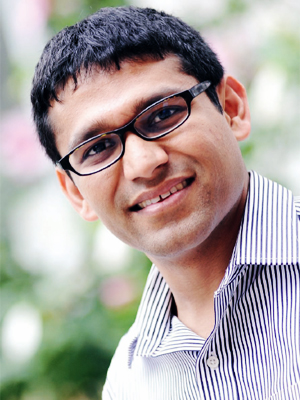Professor Goyal’s Students Tops at 2015 INFORMS Conference
The four IEOR finalists at the recent INFORMS Annual Meeting had one thing in common: Vineet Goyal.
Four students in the Department of Industrial Engineering and Operations Research (IEOR) were finalists at the recent INFORMS (Institute for Operations Research and Management Science) Annual Meeting and they had one thing in common: they all worked with IEOR Associate Professor Vineet Goyal.

Vineet Goyal —Photo by Eileen Barroso
The seven finalists for the George E. Nicholson Student Paper competition, one of the most prestigious student competitions in the conference, included three PhD students: Antoine Desir, Chun Ye, and Brian Lu. Desir and Ye presented their paper on “Capacity Constrained Assortment Optimization under the Markov chain based choice Model'' and Lu gave his "On the Adaptivity Gap in Two-stage Robust Linear Optimization under Uncertain Constraints." Goyal is the advisor for both Lu and Desir, who was also a finalist in last year’s competition and the 2014 MSOM (INFORMS’ Manufacturing and Service Operations Management Society) Student Paper Competition. Ye works with both Goyal and his advisor, IEOR Department Vice Chair and Professor Jay Sethuraman.
In addition, Omar El Housni, currently one of Goyal’s MS students, was selected as a finalist in the undergraduate student paper competition for his paper, “Piecewise Static Policies for Two-stage Adjustable Robust Linear Optimization.” His work was done during a research internship with Goyal when he was an undergraduate student at Ecole Polytechnique, Paris.
Goyal and his students are focused on optimization under uncertainty problems, on developing models and algorithms for making decisions in the face of uncertainty. One of the major challenges in this area is figuring out just how to model uncertainty. Choosing a wrong model can lead to highly sub-optimal decisions. To address this issue, Goyal’s team is designing efficient algorithms where the performance degrades gracefully with perturbations in model parameters and assumptions.
Goyal is looking particularly at revenue management, where estimating consumer preferences among substitutable options is an important element. Because you can observe selections made by the consumers but not the order of their preferences, these are challenging to model. In a recent work, Goyal and his colleagues, who include IEOR Professors Jose Blanchet and Guillermo Gallego, show that a “simple” Markov chain based substitution model provides a good approximation for a large class of choice models simultaneously. The follow-up work with Goyal’s students, Desir and Ye, obtains good approximations for the constrained optimization problems under this new model. “So this simple model,” Goyal observes, “addresses the robust model selection problem for latent preferences without much affecting the complexity of solving the related optimization problems.”
More broadly, Goyal’s work focuses on dynamic optimization problems where decisions need to be made sequentially over time as more and more information becomes available. An optimal policy in such a setting would need to specify a solution for each possible future scenario at each time period, which is nearly an impossible task in general. Goyal’s work shows that in many applications, a simple solution policy that can be computed efficiently also provides a near-optimal approximation as compared to an optimal dynamic policy. Simple models and simple solution policies also usually provide better insights as compared to their complex counterparts.
“Our recurring theme is that a simple model, or a simple solution policy, can capture most of the benefit, in prediction power or performance, of a complex model or solution in many applications,” says Goyal, who is also a member of Columbia’s Data Science Institute and works with large data sets when building his models.
“We all, from individuals to businesses and even governments, have to make decisions without knowing what the future may bring,” he adds, “so these simple models or solution policies provide an efficient and robust approach for decision-making under uncertainty. This can affect everything from preparing for future demands in electricity markets to predicting future asset returns in financial markets and more.”
“Professor Goyal is both an exceptional researcher and an outstanding teacher,” notes IEOR Department Chair and Professor Garud Iyengar. “He’s won numerous awards, including a 2014 IBM Faculty Award, a 2013 Google Faculty Award, and a 2014 NSF CAREER award, and with the recent great results at INFORMS, it’s clear his students are greatly benefitting from his expertise and tutelage. He is an esteemed colleague."
